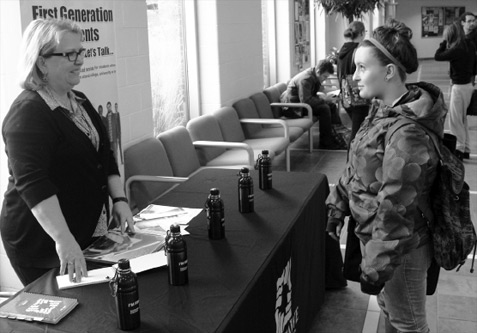Supporting first generation students
 CREDIT: ERIKA FAUST
CREDIT: ERIKA FAUSTJan Robblee, student success advisor for first generation students, talks to Christy Guenther, a first generation student in her first year of Fanshawe's Developmental Services Worker program. Robblee set up a booth in F hallway on October 10 to reach out
Students who are the first generation of their family to attend post-secondary education (that is, their parents didn't attend college or university) may face unique challenges in attending school, such as anxiety about not knowing what to expect or negativity from family members.
Fanshawe has a support system in place for these first generation students.
Jan Robblee is the first generation student success advisor, and though she only started this job just over two weeks ago, she's already answered over 50 emails and met with over half a dozen students. "There are 2,100 students in the college this year that fit the criteria for first generation. Isn't that amazing? I think that's a lot of people," she exclaimed.
Robblee provides a listening ear for the emotional side of being a first generation student, as she comes into the job with plenty of first-hand experience. "I understand what it's like to be a mature student and also have a family and go to school," she said. She graduated from Fanshawe's Computer Systems Support program 16 years ago, while working at the College and raising two public-school-aged children. She said it was tough at times, but it was also important to have her family's support. "You know how when children bring home their work and parents are supposed to read it and sign it and send it back? My son signed one of my tests and made me take it back to the teacher. It was cute! I had to take it in, I just thought it was hilarious."
In her time at Fanshawe, Robblee has worked in Life Skills, Blue Print (Literacy and Basic Skills) and Academic and Career Entrance, most recently working as the student success advisor in the School of General Arts and Science. "It's been a natural progression where I've moved from one level of education to the next, and along the way I've worked with many people who have fit this (first generation) bill; they either were first generation or were trying to get their grade 12 or just trying to get their life together. It seemed like a really perfect fit when I saw the job come up."
Robblee's main focus is on support, and while she can't have one-on- one meetings with every first-generation student here, she can point them to resources on campus.
Online, students can turn to Fanshawe's page for first generation students (www.fanshawec.ca/1stGen), which contains information for students and their families. There is also the First Year @ Fanshawe page (www.fanshawec.ca/firstyear), which is a helpful resource that links to all kind of information about what students need to know about attending Fanshawe. The Becoming a Better Student free online class (accessible through FanshaweOnline, click on Self Registration in the top right corner) offers tips for study strategies, goal-setting, time-management and more.
Another source of support is the staff at Career Services (D1063), who have online services to help students find jobs, define strategies for effective job searches and more. Students can also take a personality and aptitude test at Counselling and Accessibility Services (F2010) to explore future careers and discuss the results with a counsellor.
There is help on the financial side of things, too. First generation students can apply to the First Generation Student Bursary once every year. The fall semester application is now closed, but the winter semester applications will open in 2013. This scholarship, worth up to $1,000, is based on financial need. For more information, visit fanshawemoney.ca.
Students who have questions or concerns about being a first generation student can contact Robblee by email at jrobblee@fanshawec.ca or by phone at 519-452-4430 ext. 3914. She is also available to chat by appointment.













